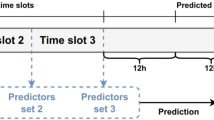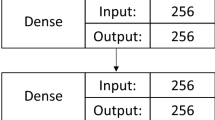Abstract
The accurate prediction of likely discharges and estimates of length of stay (LOS) aid in effective hospital administration and help to prevent access block. Machine learning (ML) may be able to help with these tasks. For consecutive patients admitted under General Medicine at the Royal Adelaide Hospital over an 8-month period, daily ward round notes and relevant discrete data fields were collected from the electronic medical record. These data were then split into training and testing sets (7-month/1-month train/test split) prior to use in ML analyses aiming to predict discharge within the next 2 days, discharge within the next 7 days and an estimated date of discharge (EDD). Artificial neural networks and logistic regression were effective at predicting discharge within 48 h of a given ward round note. These models achieved an area under the receiver operator curve (AUC) of 0.80 and 0.78, respectively. Prediction of discharge within 7 days of a given note was less accurate, with artificial neural network returning an AUC of 0.68 and logistic regression an AUC of 0.61. The generation of an exact EDD remains inaccurate. This study has shown that repeated estimates of LOS using daily ward round notes and mixed-data inputs are effective in the prediction of general medicine discharges in the next 48 h. Further research may seek to prospectively and externally validate models for prediction of upcoming discharge, as well as combination human-ML approaches for generating EDDs.

Similar content being viewed by others
References
Ou L, Chen J, Young L, Santiano N, Baramy L, Hillman K (2011) Effective discharge planning—timely assignment of an estimated date of discharge. Aust Health Rev 35(3):357–363
Bacchi S, Gluck S, Tan Y, Chim I, Cheng J, Gilbert T, Menon DK, Jannes J, Kleinig T, Koblar S (2020) Prediction of general medical admission length of stay with natural language processing and deep learning: a pilot study. Intern Emerg Med. https://doi.org/10.1007/s11739-019-02265-3
Huang Z, Juarez JM, Duan H, Li H (2013) Length of stay prediction for clinical treatment process using temporal similarity. Expert Syst Appl 40(16):6330–6339. https://doi.org/10.1016/j.eswa.2013.05.066
Youden WJ (1950) Index for rating diagnostic tests. Cancer 3:32–35
Hand DJ (2012) Assessing the performance of classification methods. Int Stat Rev 80(3):400–414. https://doi.org/10.1111/j.1751-5823.2012.00183.x
Falavigna G, Costantino G, Furlan R, Quinn JV, Ungar A, Ippoliti R (2018) Artificial neural networks and risk stratification in emergency departments. Intern Emerg Med 14(2):291–299. https://doi.org/10.1007/s11739-018-1971-2
Obermeyer Z, Emanuel E (2016) Predicting the future—big data, machine learning, and clinical medicine. N Engl J Med 375(13):1216–1219
Funding
This research did not receive any specific grant from funding agencies in the public, commercial, or not-for-profit sectors.
Author information
Authors and Affiliations
Corresponding author
Ethics declarations
Conflict of interest
The authors declare that they have no conflict of interest.
Statement of human and animal rights
Ethics approval was granted for this project by the Central Adelaide Local Health Network Research Ethics Committee (HREC/19/CALHN/209).
Informed consent
For this type of study, a waiver of consent was granted, and consent was not required.
Additional information
Publisher's Note
Springer Nature remains neutral with regard to jurisdictional claims in published maps and institutional affiliations.
Rights and permissions
About this article
Cite this article
Bacchi, S., Gluck, S., Tan, Y. et al. Mixed-data deep learning in repeated predictions of general medicine length of stay: a derivation study. Intern Emerg Med 16, 1613–1617 (2021). https://doi.org/10.1007/s11739-021-02697-w
Received:
Accepted:
Published:
Issue Date:
DOI: https://doi.org/10.1007/s11739-021-02697-w




